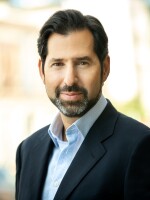Republican vice presidential candidate Sarah Palin is emerging from her protective media bubble. In interviews with ABC News, she says she "didn't blink" when asked to be John McCain's running mate and said she's ready for the job.
That was the crux of Palin's answer to the first question from ABC's Charles Gibson, who inquired in a series of interviews about her decision to accept the place on the Republican ticket, her national security positions and her stances on energy and the environment.
"I have the confidence in that readiness and knowing that you can't blink," Palin told Gibson. "You have to be wired in a way of being so committed to the mission, the mission that we're on — reform of this country and victory in the war — you can't blink. So I didn't blink then, even, when asked to run as his running mate."
High Stakes For Candidate And Interviewer
Both Palin and Gibson had a lot at stake in these three interviews, which were taped in Alaska for broadcasts Thursday and Friday. Palin is largely unknown on the national scene, and the immediate media scrutiny of her record and of aspects of her family's life led to an angry reaction from the McCain camp, which initially withheld her from the typical round of interviews with journalists.
The campaign is also gambling that the vice presidential nominee can dominate the start of the third week of coverage since her nomination, which has eroded Democratic nominee Barack Obama's lead in the polls.
Gibson is carrying the weight of much Republican anger at the media — both organic and manufactured — and will be watched closely to see how fairly he handles the interview. And, the political left is also paying close attention to see whether he can ask tough questions of Palin, as many liberals felt he read questions off Republican talking points during a Democratic debate he moderated for ABC during the primaries.
ABC is milking the exclusive for all it's worth, spreading out excerpts over five separate news programs during the two days.
Palin On Bush Doctrine
During the excerpts of the first two interviews, Palin came off as a committed conservative in sync with running mate John McCain. She's comfortable before television cameras and projects an appealing personality. But she also conveyed a degree of vagueness and uncertainty in many of her replies.
When Gibson asked about being the head of the Alaska National Guard or being governor of a state in geographic proximity to Russia — both facts cited by McCain aides to bolster her credentials — Palin deflected the question. Instead, she described her work on energy policy both before and during her relatively brief stretch as governor.
A more awkward exchange followed:
Gibson: "Do you agree with the Bush Doctrine?"
Palin: "In what respect, Charlie?"
Gibson asked again without getting a direct response, and it appeared that Palin was not clear on what the Bush Doctrine is until Gibson defined it.
While many people may not know the policy by that name, the Bush Doctrine refers to the president's strategy, set out in September 2002, before the invasion of Iraq. It permits the United States to pre-emptively and unilaterally invade another country from which it determines there is a threat, "even if uncertainty remains as to the time and place of the enemy's attack."
It is considered a departure from the policy of previous American administrations.
Ultimately, Palin told Gibson the U.S. has every right to defend its people if it has "legitimate and enough intelligence that tells us a strike is imminent."
She also took a tough line on Russia, calling for the admission of Georgia to NATO despite Russian Prime Minister Vladimir Putin's objection. She said the U.S. should consider sanctions against Russia and, responding to a direct question from Gibson, said it should even consider American military involvement if required to protect Georgia.
Palin On Global Warming And Energy Policy
In the second interview, Gibson asked about global warming. In some previous interviews, Palin had expressed doubt on whether human activities have contributed to global warming. This time, Palin signaled that she believes human activities might play a role, but in carefully couched language:
Gibson: "Yes, but isn't it critical as to whether or not it's man-made, because what you do about it depends on whether it's man-made?"
Palin: "That is why I'm attributing some of man's activities to potentially causing some of the changes in the climate right now."
Gibson: "But I — color me a cynic — but I hear a little bit of change in your policy there. When you say yes, now you're beginning to say it is man-made. It sounds to me like you're adapting your position to Sen. McCain's."
Palin: "I think you are a cynic, because show me where I have ever said that there's absolute proof that nothing that man has ever conducted or engaged in has had any effect, or no effect, on climate change."
She seemed most at ease talking about energy policy with Gibson as they walked alongside a stretch of the Alaska pipeline. She said she still favored drilling for oil in a portion of a protected national wildlife refuge in Alaska, even though McCain opposes it — and that she hopes to bring him around.
Excerpts from the third and final interview are scheduled to be shown later Friday on World News Tonight and 20/20.
Copyright 2022 NPR. To see more, visit https://www.npr.org. 9(MDAzMjM2NDYzMDEyMzc1Njk5NjAxNzY3OQ001))






